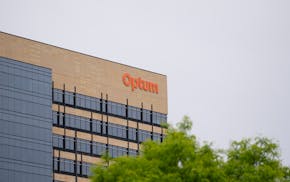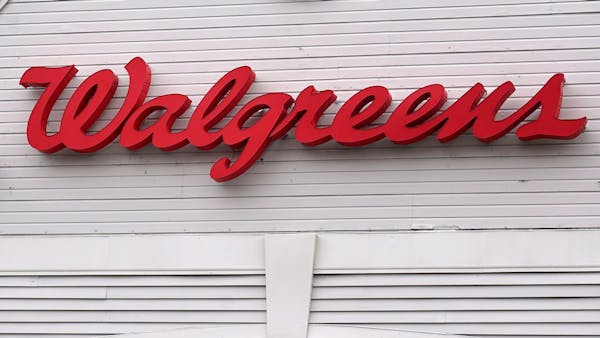Richard Gillert stopped at North Market for half-price produce on a recent Wednesday.
He appreciates not just the Wednesday specials but the convenience of the store, a half mile from his north Minneapolis home. "This is the only thing around," he said.
North Market opened five years ago with a mission: become an oasis in a federally designated food desert. This role has become all the more important since the north Minneapolis Aldi — one of the area's only grocers selling fresh, affordable produce — closed last Sunday.
The market opened with notable fanfare in December 2017 as a new kind of social enterprise. Pillsbury United Communities raised $6 million, including $2 million in state funding, to convert a long vacant Kowalski's into the new store.
"At that time, north Minneapolis was one of the largest food deserts in the nation," said Vanan Murugesan, head of transformation for Pillsbury United Communities.
Today, the market operates on store revenue and up to 20% in donor funding to support programs like the half-off Wednesday produce.
"I think the significance of having something like North Market in our community is knowing that they're responding to a community need," said Princess Haley, co-founder of nonprofit Appetite for Change, a neighborhood organization with community gardens and other programs. "They didn't just pop up and do business as usual because they operate grocery stores. They're not going to leave."
While the goal initially was for the store to be fully supported by store revenue, Murugesan said the nonprofit believes it can sustain its current approach of raising money to offset revenue gaps.
Aldi's unexpected closure 2 miles south at Penn and Lowry avenues upset many neighbors in a swath of the city where many walk or bus to grocery shop.
In a statement, Aldi said the store closure was "due to the inability to renovate the store to accommodate our larger product range and our current lease term expiring."
Besides North Market, the only other full-service grocer in north Minneapolis is the Cub 3½ miles away.
"Cub remains committed to operating the Northside store because it's the right thing to do, especially as other retailers leave the area," Mike Stigers, chief executive of Cub Foods, said in an email. After the unrest following the murder of George Floyd, the Cub was rebuilt with a community center that neighbors sought.
Other options in north Minneapolis are discounter So Low Grocery outlet and convenience stores. Some residents drive or bus to Hy-Vee in Robbinsdale or Walmart in Brooklyn Center.
Pharmacies, other than the location at the north Minneapolis Cub, also are becoming more scarce. Walgreens plans to close its W. Broadway location, and CVS no longer has stores in the area.
As a small, independent grocer, North Market can't beat the prices at big-box retailers such as Walmart or Target, Murugesan said. And while shoppers can find most everything they need near home to put a meal on the table at North Market, Murugesan believes most also stock up at another store — a common practice among consumers.
The store is supplied by Cub Foods' parent company United Natural Foods Inc., offering many familiar brands for residents.
Fernando Burga, an assistant professor at the University of Minnesota's Humphrey School, is conducting a research project, exploring how and why north Minneapolis became a destination for fast food.
His initial research focused on how the expansion of Interstate 94 in the 1950s and 1960s changed W. Broadway from a main street feel to an urban artery.
The ongoing project is looking for ways to transform north Minneapolis' food landscape from fast-food intensive to one with healthier options. Burga sees North Market as a fascinating model.
"It's almost the alternative to the corporate models," he said. "This social enterprise venture ... has its own set of challenges to balance demand and supply. It's definitely a space for innovation, to think about these issues."
The concept behind North Market is to be more than just a grocery store — to be a community anchor. The houses outside the store used to be abandoned, but a vibrancy has taken root nearby, Murugesan said. Hennepin County opened a library branch next door around the time of North Market's debut, and Get Down Coffee opened across the street in entrepreneur Houston White's building.
White, who is also behind a new apartment building going up near the store, envisions turning the Webber-Camden neighborhood into Camdentown, where Black middle-class families can feel comfortable settling down.
"Since I was a young kid, I used to ride my bike up here because it was a little bit of a respite from where my house was," he said. "I've always loved this neighborhood. It's a dream to own a space up here."
North Market is critical to Camdentown's future, White said.
"I think as far as we've come with this idea of Camdentown, we wouldn't be as far along in terms of people really seeing the potential without the market as a mainstay in the neighborhood."

DOGE cuts federal money for upgrades at Velveeta plant in New Ulm

Minnesota factories see orders tank on continued trade uncertainty
'We don't want to lose this mine': Fear sets in for Iron Range miners as shutdown takes hold

UnitedHealth sues the Guardian, alleging defamation in coverage of nursing home care

